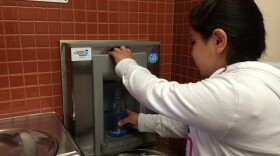The city of Arvin, south of Bakersfield, is struggling to stay healthy. Nearly a quarter of its 20,000 residents fall below the poverty line, and surrounding Kern County has one of the highest diabetes burdens in the state. As part of an ongoing effort to get kids out of the house and active, an event last week connected Arvin middle-schoolers with free bicycles—but where the bicycles came from may surprise you.

When Jorge Rocha heard the announcement at school that free bikes were available for a handful of seventh graders, he knew what to do: “Get to the office fast as I can to sign up,” the 12-year-old says.
He’s wanted a new bike for about two years, ever since his old one fell apart. “I kind of want something to ride to school, because I don't have anything else,” he says.
Today, Jorge is one of about 30 students from Haven Drive Middle School in Arvin getting new bikes courtesy of the non-profit organizations Dolores Huerta Foundation and Bike Bakersfield. Here in a parking lot outside the school, kids wiz past on pink, black and green beach cruisers, streamers blowing and bike bells pinging.
These bikes aren’t exactly new. In fact, they’re used, and they’ve been donated. Some are pretty beat up. So mechanics from the non-profit Bike Bakersfield are on site to show the kids how to fix up their new wheels. And that advice is needed—these bikes have some unique problems.
“As part of the initial screening of these bikes, there was a lot of stripping of fur and psychedelic duct tape, things like that,” says Bike Bakersfield director Adam Kahler while snipping a string of lights out of some rusty spokes. “They were at Burning Man, so the desert kind of did a number on some of them.”
Burning Man. The frenetic celebration of art and community that draws 70,000 people—and their bikes—to the Nevada desert every August. Contrary to one of the festival’s 10 guiding principles—leave no trace—these bicycles were left behind. And they’re now being donated to a community with low incomes and a high disease burden.

“The purpose of this event is for the kids to have ownership over their bicycles,” says Elizabeth Martinez, a health policy organizer with Dolores Huerta Foundation who organized today’s event. “We're teaching them how to fix their bikes on their own, and we're also motivating them to be physically active due to so much high diabetes, obesity, and other chronic illnesses here in our community.”
Here in Kern County, anywhere from seven to nine percent of residents have been diagnosed with diabetes, and county data show that Kern has the state’s highest rate of diabetes deaths. Poverty is high, too, so affording bikes can be tough.

“We promote healthy eating, active living,” she says. “In order for you to be healthy, you got to eat healthy, you have to be active, and a lot of times there's barriers, especially in our little cities.”
So today’s event is for a serious cause, but it’s fun, too. There’s music, snacks, and surprises. “Someone just popped a tire,” Martinez laughs, after what sounds like a gunshot echoes throughout the parking lot.
Respecting the environment is at the core of Burning Man, and yet hordes of bikes are left on the playa each year. The Burning Man non-profit couldn’t nail down exactly how many are typically are left behind in time for this story, but an article from 2014 reported roughly 2,000 abandoned bikes that year alone.
So just what is the attitude toward leaving bikes at Burning Man? I ask Joie Adams, a so-called “burner” in Fresno who’s been to the festival five times. She says trash such a big deal it has its own name: “'Moop'—matter out of place," Adams says. “You do not leave trash. You take it with you. You bring it in, you take it out. And there is a huge community of burners that stay behind and they scour every little grain of sand for cigarette butts, for anything that’s left behind.”

For most burners, Adams says it’s a matter of principle to not just collect their own moop, but to pack out any they find while there. “If I see something in the street, I stop and I pick it up and I put it in my basket, I put it in my little trash baggy in my tent and I take it home with me,” says Adams.
Adams says: sure, it’s a shame some people are so careless. Another burner refers to abandoning a Burning Man bike as “unforgivable moopage.”
But giving back? That’s a huge part of the experience, too. This bicycle program is “like Burning Man happening in real life,” Adams says. “That's awesome. It actually gets me a little choked up.”
After all, gift giving and civic responsibility are also some of the festival’s ten principles.





